Charles E W Bean, Diaries, AWM38 3DRL 606/228/1 - Folder - Part 11
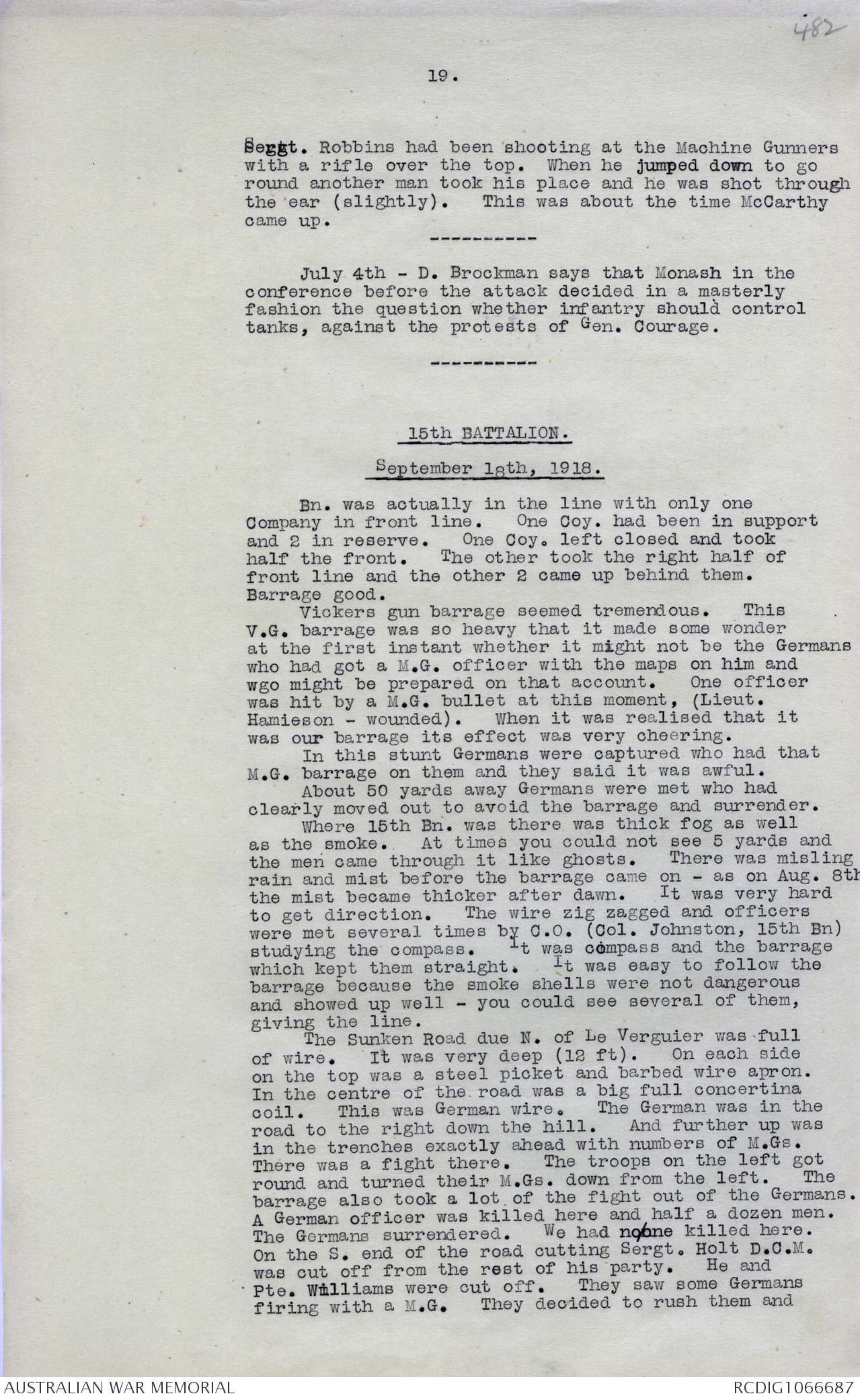
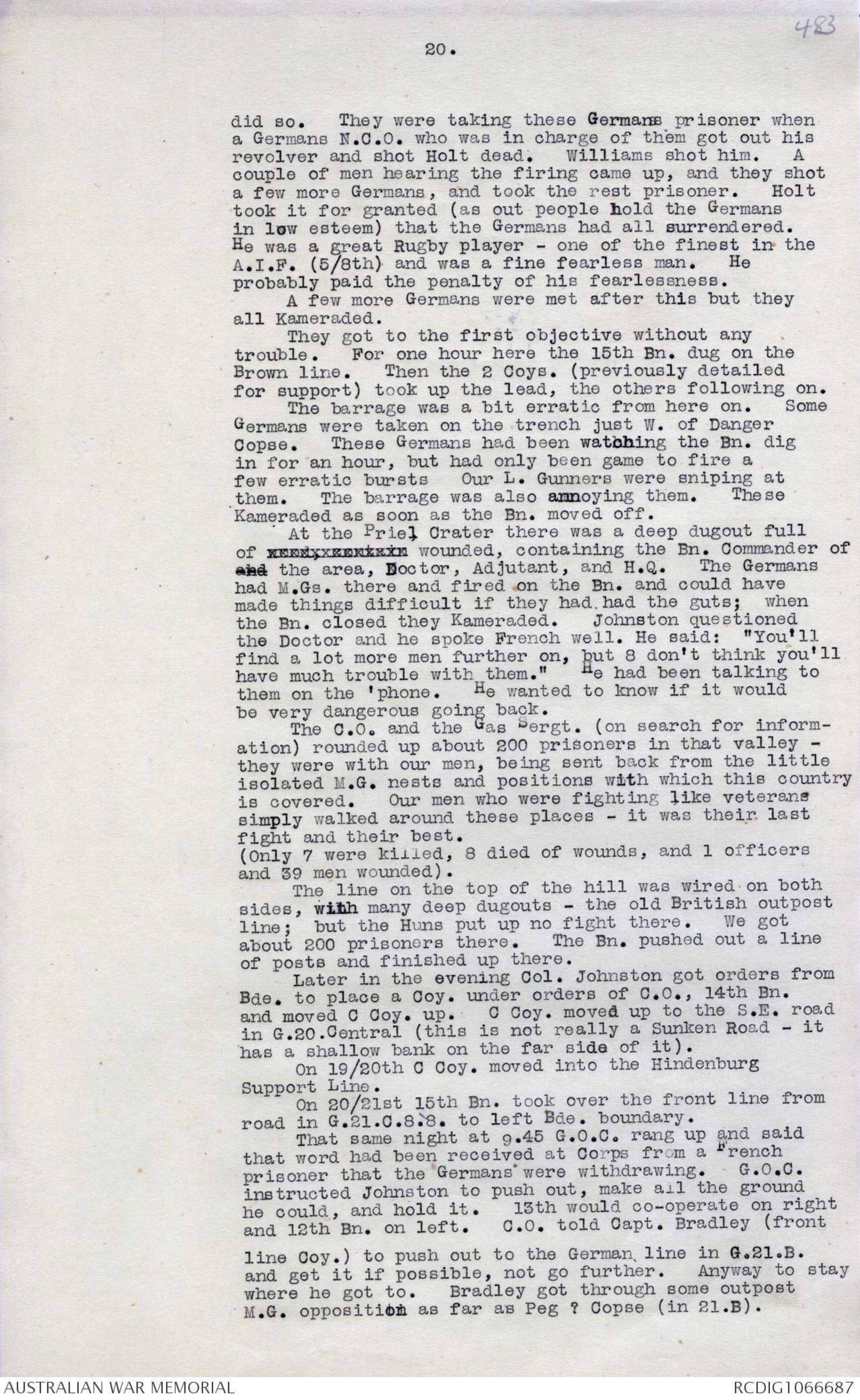
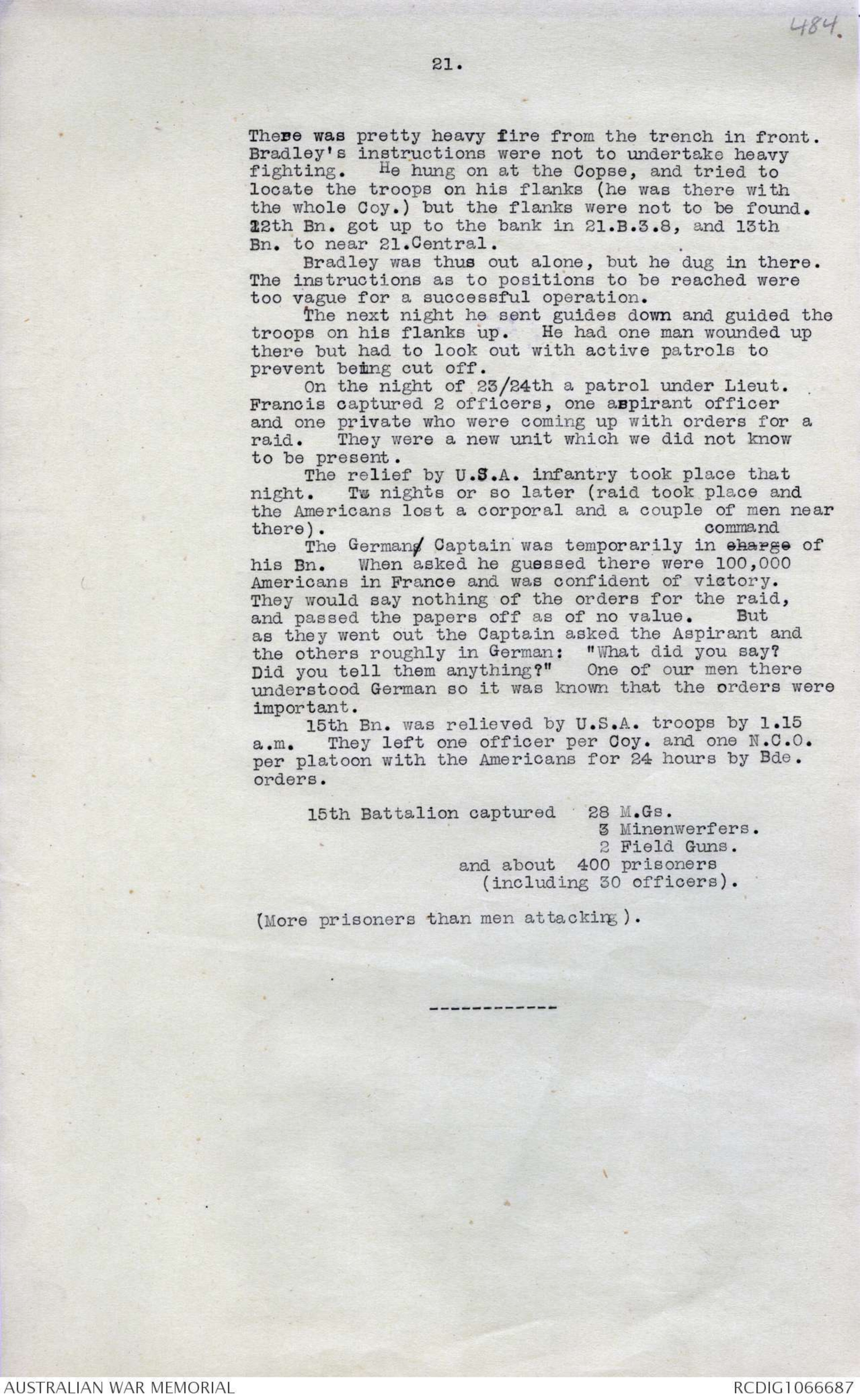
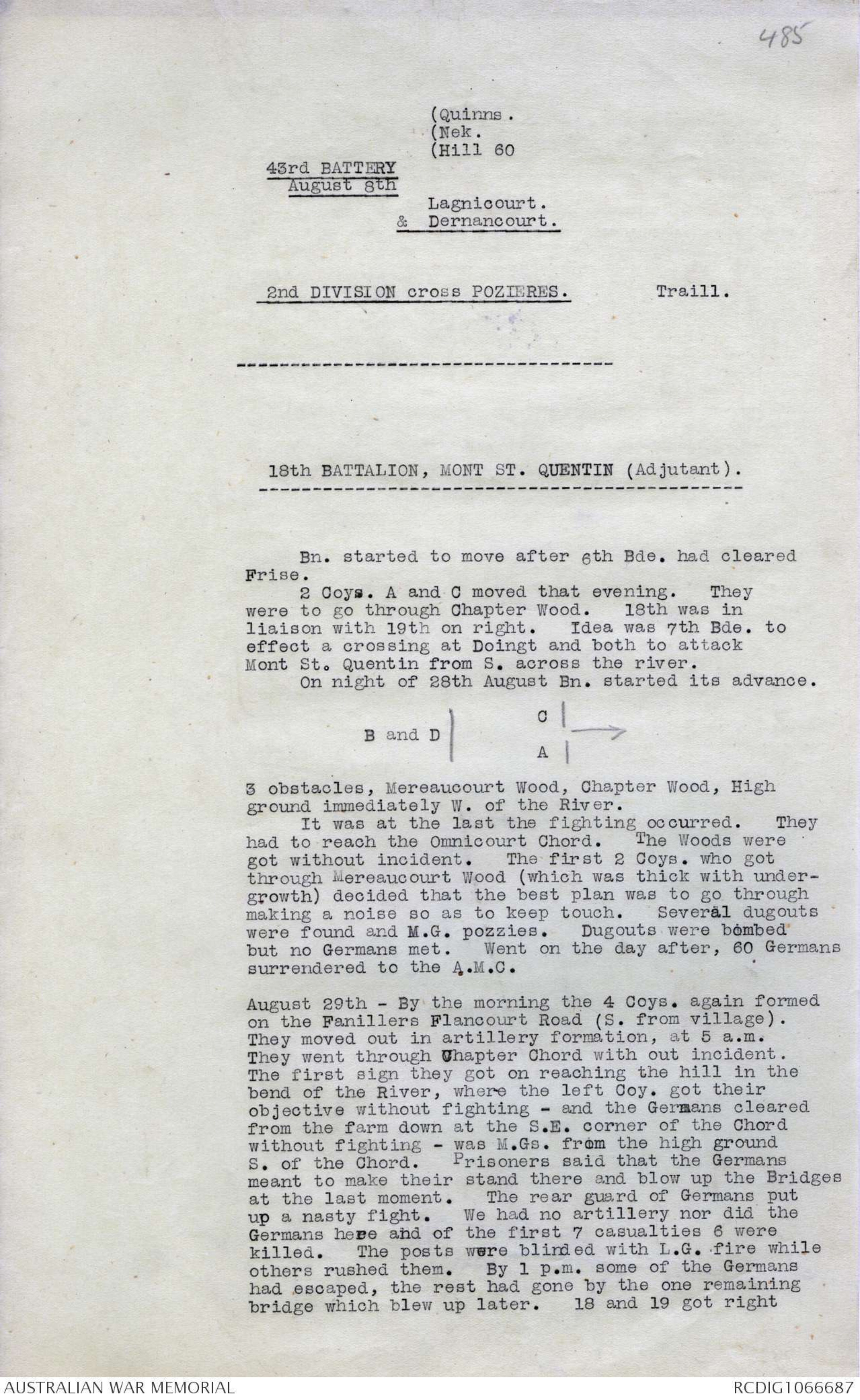
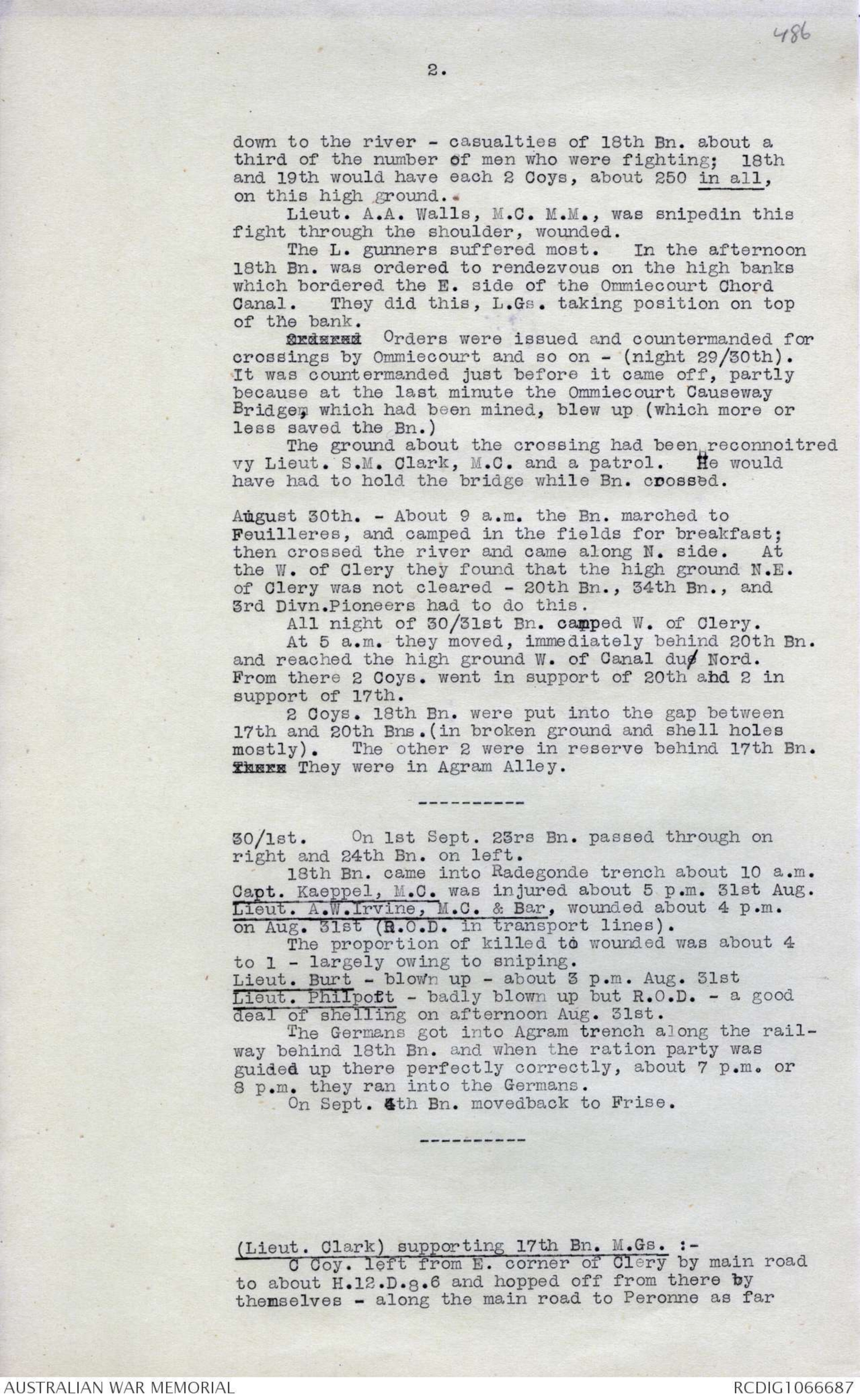
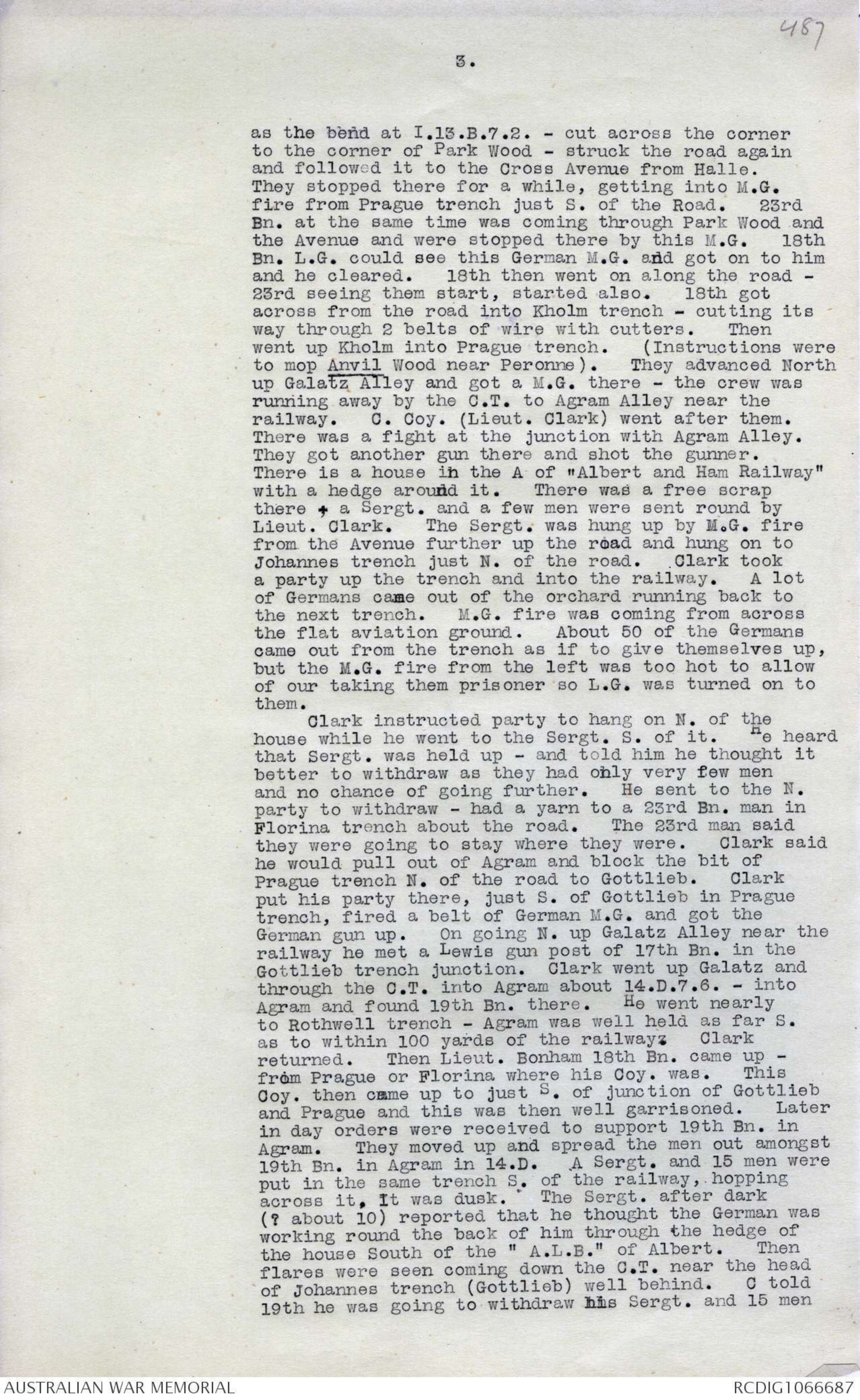
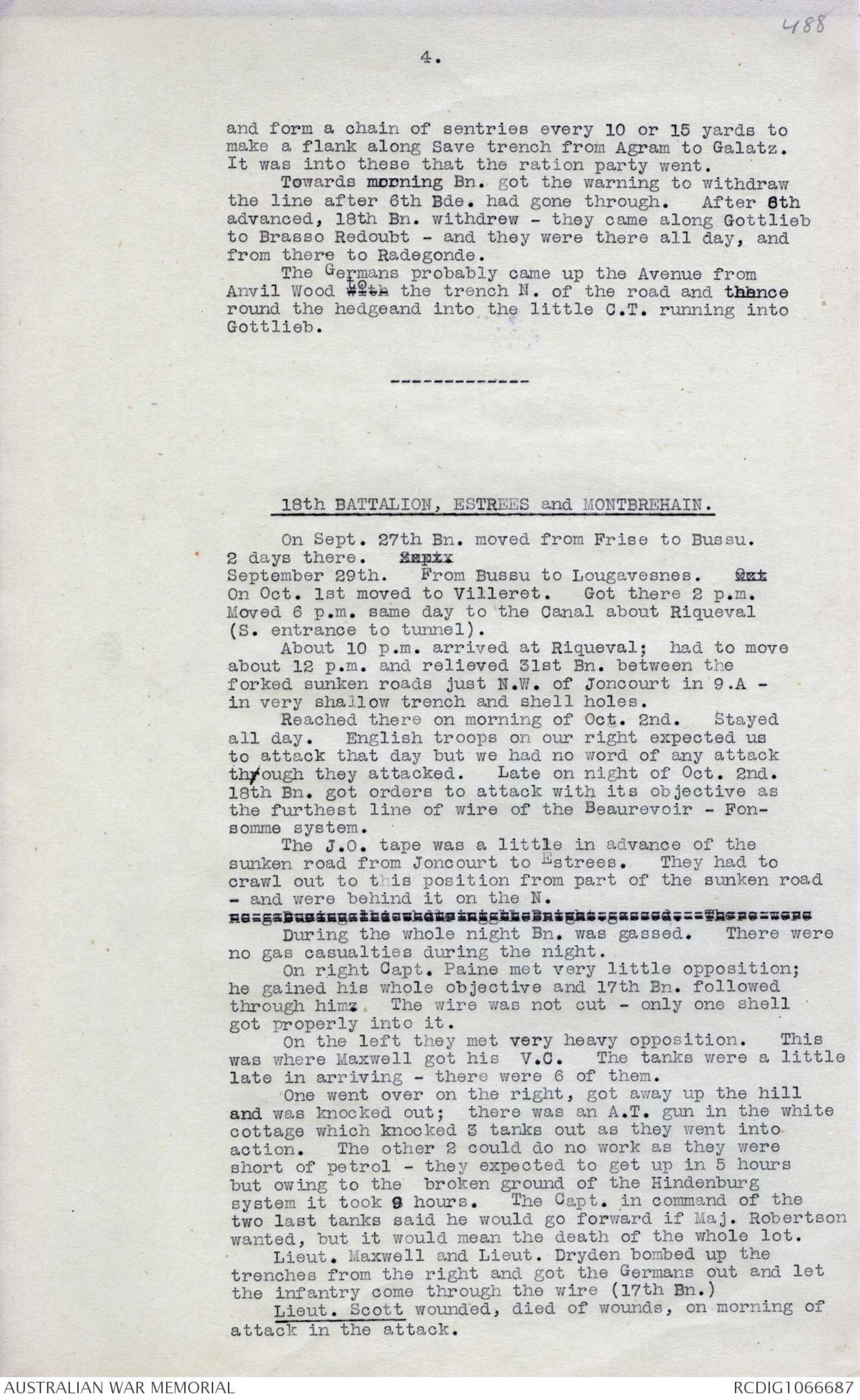
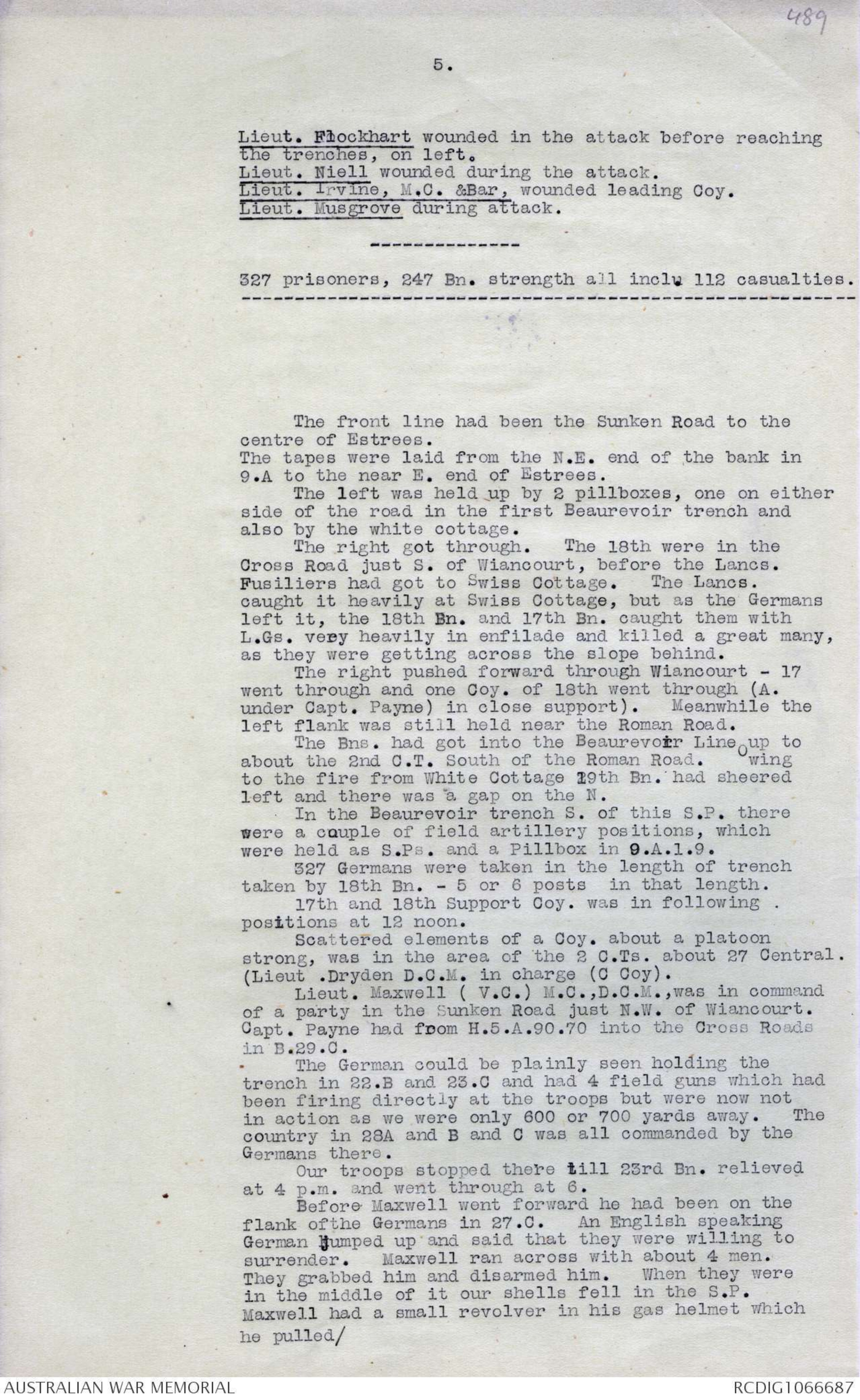
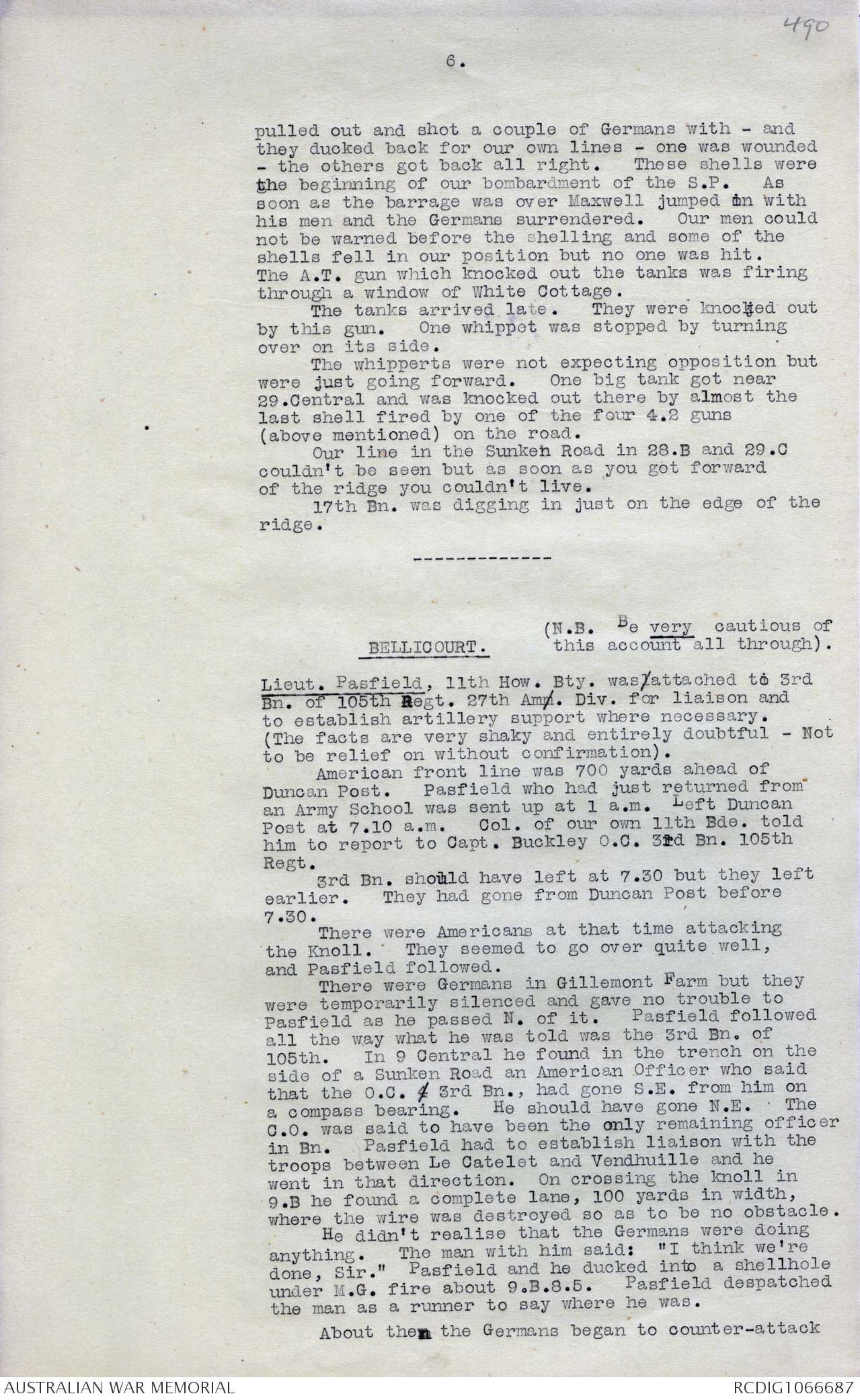
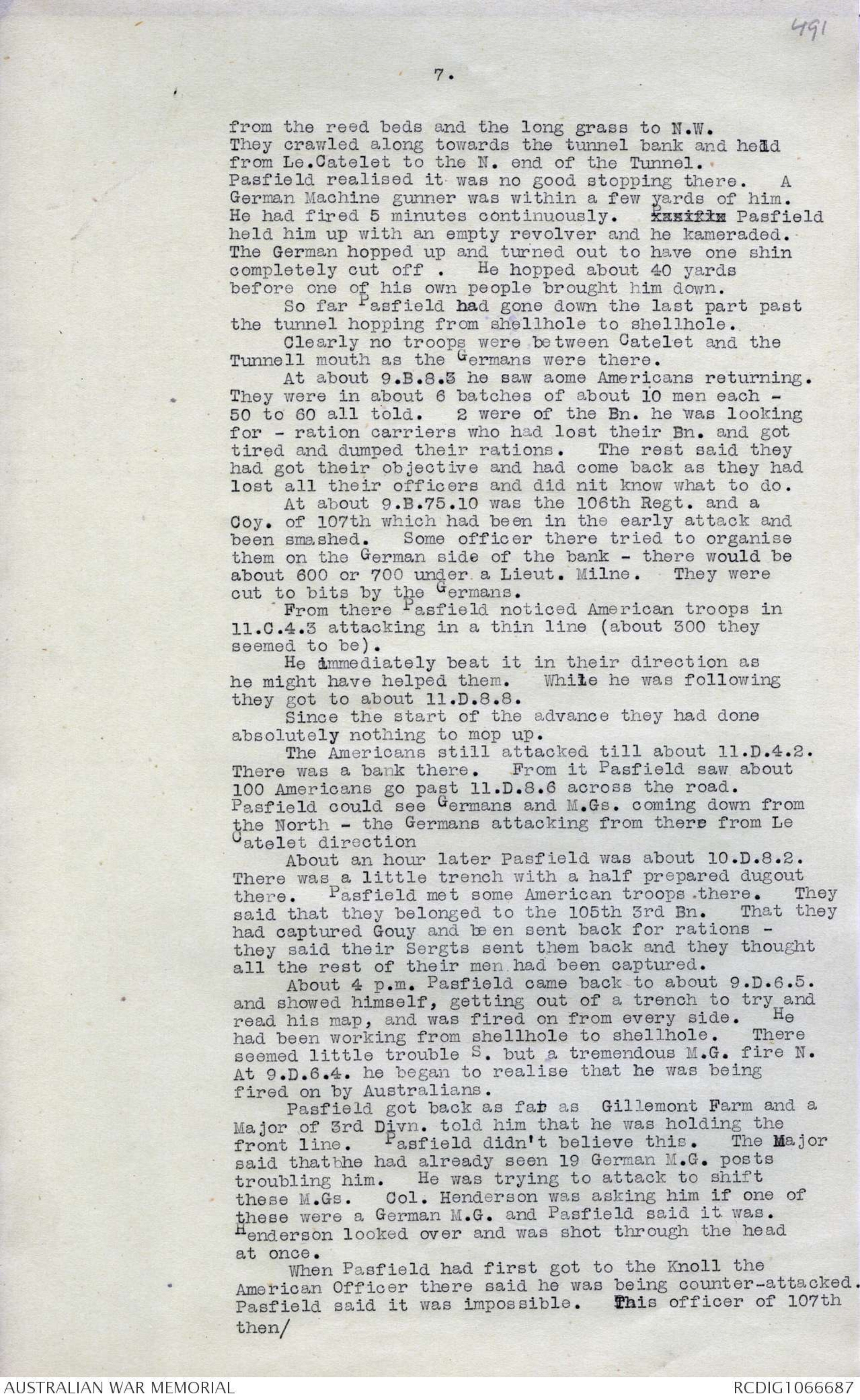
482
19.
Sergt. Robbins had been shooting at the Machine Gunners
with a rifle over the top. When he jumped down to go
round another man took his place and he was shot through
the ear (slightly). This was about the time McCarthy
came up.
July 4th - D. Brockman says that Monash in the
conference before the attack decided in a masterly
fashion the question whether infantry should control
tanks, against the protests of Gen. Courage.
----
15th BATTALION.
September l8th, 1918.
Bn. was actually in the line with only one
Company in front line. One Coy. left closed and took
half the front. The other took the right half of
front line and the other 2 came up behind them.
Barrage good.
Vickers gun barrage seemed tremendous. This
V.G. barrage was so heavy that it made some wonder
at the first instant whether it might not be the Germans
who had got a M.G. officer with the maps on him and
wgo might be prepared on that account. One officer
was hit by a M.G. bullet at this moment, (Lieut.
Hamieson - wounded). When it was realised that it
was our barrage its effect was very cheering.
In this stunt Germans were captured who had that
M.G. barrage on them and they said it was awful.
About 50 yards away Germans were met who had
clearly moved out to avoid the barrage and surrender.
Where 15th Bn. was there was thick fog as well
as the smoke. At times you could not see 5 yards and
the men came through it like ghosts. There was misling
rain and mist before the barrage came on - as on Aug. 8th
the mist became thicker after dawn. It was very hard
to get direction. The wire zig zagged and officers
were met several times by C.O. (Col. Johnston, 15th Bn)
studying the compass. It was compass and the barrage
which kept them straight. It was easy to follow the
barrage because the smoke shells were not dangerous
and showed up well - you could see several of them,
giving the line.
The Sunken Road due N. of Le Verguier was full
of wire. It was very deep (12 ft). On each side
on the top was a steel picket and barbed wire apron.
In the centre of the road was a big full concertina
coil. This was German wire. The German was in the
road to the right down the hill. And further up was
in the trenches exactly ahead with numbers of M.Gs.
There was a fight there. The troops on the left got
round and turned their M.Gs. down from the left. The
barrage also took a lot of the fight out of the Germans.
A German officer was killed here and half a dozen men.
The Germans surrendered. We had no one killed here.
On the S. end of the road cutting Sergt. Holt D.C.M.
was cut off from the rest of his party. He and
Pte. Williams were cut off. They saw some Germans
firing with a M.G. They decided to rush them and
483
20.
did so. They were taking these Germans prisoner when
a Germans N.C.O. who was in charge of them got out his
revolver and shot Holt dead. Williams shot him. A
couple of men hearing the firing came up, and they shot
a few more Germans, and took the rest prisoner. Holt
took it for granted (as out people hold the Germans
in low esteem) that the Germans had all surrendered.
He was a great Rugby player - one of the finest in the
A.I.F. (5/8th) and was a fine fearless man. He
probably paid the penalty of his fearlessness.
A few more Germans were met after this but they
all Kameraded.
They got to the first objective without any
trouble. For one hour here the 15th Bn. dug on the
Brown line. Then the 2 Coys. (previously detailed
for support) took up the lead, the others following on.
The barrage was a bit erratic from here on. Some
Germans were taken on the trench just W. of Danger
Copse. These Germans had been watching the Bn. dig
in for an hour, but had only been game to fire a
few erratic bursts Our L. Gunners were sniping at
them. The barrage was also annoying them. These
Kameraded as soon as the Bn. moved off.
At the Priel Crater there was a deep dugout full
of xxxxxxxxxxxxx wounded, containing the Bn. Commander of
the area, Doctor, Adjutant, and H.Q. The Germans
had M.Gs. there and fired on the Bn. and could have
made things difficult if they had had the guts; when
the Bn. closed they Kameraded. Johnston questioned
the Doctor and he spoke French well. He said: "You'll
find a lot more men further on, but 8 don't think you'll
have much trouble with them." He had been talking to
them on the 'phone. He wanted to know if it would
be very dangerous going back.
The C.O. and the Gas Sergt. (on search for information)
rounded up about 200 prisoners in that valley -
they were with our men, being sent back from the little
isolated M.G. nests and positions with which this country
is covered. Our men who were fighting like veterans
simply walked around these places - it was their last
fight and their best.
(Only 7 were killed, 8 died of wounds, and 1 officers
and 39 men wounded).
The line on the top of the hill was wired on both
sides, with many deep dugouts - the old British outpost
line; but the Huns put up no fight there. We got
about 200 prisoners there. The Bn. pushed out a line
of posts and finished up there.
Later in the evening Col. Johnston got orders from
Bde. to place a Coy. under orders of C.O., 14th Bn.
and moved C Coy. up. C Coy. moved up to the S.E. road
in G.20.Central (this is not really a Sunken Road - it
has a shallow bank on the far side of it).
On 19/20th C Coy. moved into the Hindenburg
Support Line.
On 20/21st 15th Bn. took over the front line from
road in G.21.C.8.8. to left Bde. boundary.
That same night at 9.45 G.O.C. rang up and said
that word had been received at Corps from a French
prisoner that the Germans were withdrawing. G.O.C.
instructed Johnston to push out, make all the ground
he could, and hold it. 13th would co-operate on right
and 12th Bn. on left. C.O. told Capt. Bradley (front
line Coy.) to push out to the German line in G.21.B.
and get it if possible, not go further. Anyway to stay
where he got to. Bradley got through some outpost
M.G. opposition as far as Peg ? Copse (in 21.B).
484
21.
There was pretty heavy fire from the trench in front.
Bradley's instructions were not to undertake heavy
fighting. He hung on at the Copse, and tried to
locate the troops on his flanks (he was there with
the whole Coy.) but the flanks were not to be found.
12th Bn. got up to the bank in 21.B.3.8, and 13th
Bn. to near 21. Central.
Bradley was thus out alone, but he dug in there.
The instructions as to positions to be reached were
too vague for a successful operation.
The next night he sent guides down and guided the
troops on his flanks up. He had one man wounded up
there but had to look out with active patrols to
prevent being cut off.
On the night of 23/24th a patrol under Lieut.
Francis captured 2 officers, one aspirant officer
and one private who were coming up with orders for a
raid. They were a new unit which we did not know
to be present.
The relief by U.S.A. infantry took place that
night. Tw nights or so later (raid took place and
the Americans lost a corporal and a couple of men near
there).
command
The Germans Captain was temporarily in charge command of
his Bn. When asked he guessed there were 100,000
Americans in France and was confident of victory.
They would say nothing of the orders for the raid,
and passed the papers off as of no value. But
as they went out the Captain asked the Aspirant and
the others roughly in German: "What did you say
Did you tell them anything?" One of our men there
understood German so it was known that the orders were
important.
15th Bn. was relieved by U.S.A. troops by 1.15 a.m.
They left one officer per Coy. and one N.C.O.
per platoon with the Americans for 24 hours by Bde.
orders.
15th Battalion captured 28 M.Gs.
3 Minenwerfers.
2 Field Guns.
and about 400 prisoners
(including 30 officers).
(More prisoners than men attacking).
-----------
485
(Quinns.
(Nek.
(Hill 60
43rd BATTERY
August 8th
Lagnicourt.
& Dernancourt.
2nd DIVISION cross POZIERES. Traill.
----------------------------
18th BATTALION, MONT ST. QUENTIN (Adjutant).
---------------
Bn. started to move after 6th Bde, had cleared
Frise.
2 Coys. A and C moved that evening. They
were to go through Chapter Wood. 18th was in
liaison with 19th on right. Idea was 7th Bde. to
effect a crossing at Doingt and both to attack
Mont St. Quentin from S. across the river.
On night of 28th August Bn. started its advance.
B and D C I
->
A I
3 obstacles, Mereaucourt Wood, Chapter Wood, High
ground immediately W. of the River.
It was at the last the fighting occurred. They
had to reach the Omnicourt Chord. The Woods were
got without incident. The first 2 Coys. who got
through Mereaucourt Wood (which was thick with under-
growth) decided that the best plan was to go through
making a noise so as to keep touch. Several dugouts
were found and M.G. pozzies. Dugouts were bombed
but no Germans met. Went on the day after, 60 Germans
surrendered to the A.M.C.
August 29th - By the morning the 4 Coys. again formed
on the Fanillers Flancourt Road (S. from village).
They moved out in artillery formation, at 5 a.m.
They went through Chapter Chord with out incident.
The first sign they got on reaching the hill in the
bend of the River, where the left Coy. got their
objective without fighting - and the Germans cleared
from the farm down at the S.E. corner of the Chord
without fighting - was M.Gs. from the high ground
S. of the Chord. Prisoners said that the Germans
meant to make their stand there and blow up the Bridges
at the last moment. The rear guard of Germans put
up a nasty fight. We had no artillery nor did the
Germans here and of the first 7 casualties 6 were
killed. The posts were blinded with L.G. fire while
others rushed them. By 1 p.m. some of the Germans
had escaped, the rest had gone by the one remaining
bridge which blew up later. 18 and 19 got right
486
2.
down to the river - casualties of 18th Bn. about a
third of the number of men who were fighting; 18th
and 19th would have each 2 Coys, about 250 in all,
on this high ground.
Lieut. A.A. Walls, M.C. M.M., was snipedin this
fight through the shoulder, wounded.
The L. gunners suffered most. In the afternoon
18th Bn. was ordered to rendezvous on the high banks
which bordered the E. side of the Ommiecourt Chord
Canal. They did this, L.Gs. taking position on top
of the bank.Ordersx Orders were issued and countermanded for
crossings by Ommiecourt and so on - (night 29/30th).
It was countermanded just before it came off, partly
because at the last minute the Ommiecourt Causeway
Bridge, which had been mined, blew up (which more or
less saved the Bn.
The ground about the crossing had been reconnoitred
vy Lieut. S.M. Clark, M.C. and a patrol. He would
have had to hold the bridge while Bn. cpossed.
August 30th. - About 9 a.m. the Bn. marched to
Feuilleres, and camped in the fields for breakfast:
then crossed the river and came along N. side. At
the W. of Clery they found that the high ground N.E.
of Clery was not cleared - 20th Bn., 34th Bn., and
3rd Divn.Pioneers had to do this.
All night of 30/31st Bn. camped W. of Clery.
At 5 a.m. they moved, immediately behind 20th Bn.
and reached the high ground W. of Canal due Nord.
From there 2 Coys. went in support of 20th and 2 in
support of 17th.
2 Coys. 18th Bn. were put into the gap between
17th and 20th Bns. (in broken ground and shell holes
mostly). The other 2 were in reserve behind 17th Bn.
[There?] They were in Agram Alley.
-----------------
30/1st. On lst Sept. 23rs Bn. passed through on
right and 24th Bn. on left.
18th Bn. came into Radegonde trench about 10 a.m.
Capt. Kaeppel, M.C. was injured about 5 p.m. 31st Aug.
Lieut. A.W. Irvine, M.C. & Bar, wounded about 4 p.m.
on Aug. 31st (R.O.D. in transport lines).
The proportion of killed to wounded was about 4
to 1 - largely owing to sniping.
Lieut. Burt - blown up - about 3 p.m. Aug. 31st
Lieut. Philpott - badly blown up but R.O.D. - a good
deal of shelling on afternoon Aug. 31st.
The Germans got into Agram trench along the rail-
way behind 18th Bn. and when the ration party was
guided up there perfectly correctly, about 7 p.m. or
8 p.m. they ran into the Germans.
On Sept. 4 th Bn. movedback to Frise.
(Lieut. Clark) supporting 17th Bn. M.Gs. :-
C Coy. left from E. corner of Clery by main road
to about H.12.D.8.6 and hopped off from there by
themselves - along the main road to Peronne as far
487
3.
as the bend at I.13.B.7.2. - cut across the corner
to the corner of Park Wood - struck the road again
and followed it to the Cross Avenue from Halle.
They stopped there for a while, getting into M.G.
fire from Prague trench just S. of the Road. 23rd
Bn. at the same time was coming through Park Wood and
the Avenue and were stopped there by this M.G. 18th
Bn. L.G. could see this German M.G. and got on to him
and he cleared. 18th then went on along the road -
23rd seeing them start, started also. 18th got
across from the road into Kholm trench - cutting its
way through 2 belts of wire with cutters. Then
went up Kholm into Prague trench. (Instructions were
to mop Anvil Wood near Peronne). They advanced North
up Galatz Alley and got a M.G. there - the crew was
running away by the C.T. to Agram Alley near the
railway. C. Coy. (Lieut. Clark) went after them.
There was a fight at the junction with Agram Alley.
They got another gun there and shot the gunner.
There is a house in the A of "Albert and Ham Railway"
with a hedge around it. There was a free scrap
there a Sergt. and a few men were sent round by
Lieut. Clark. The Sergt. was hung up by M.G. fire
from the Avenue further up the road and hung on to
Johannes trench just N. of the road. Clark took
a party up the trench and into the railway. A lot
of Germans came out of the orchard running back to
the next trench. M.G. fire was coming from across
the flat aviation ground. About 50 of the Germans
came out from the trench as if to give themselves up,
but the M.G. fire from the left was too hot to allow
of our taking them prisoner so L.G. was turned on to
them.
Clark instructed party to hang on N. of the
house while he went to the Sergt. S. of it. He heard
that Sergt. was held up - and told him he thought it
better to withdraw as they had only very few men
and no chance of going further. He sent to the N.
party to withdraw - had a yarn to a 23rd Bn. man in
Florina trench about the road. The 23rd man said
they were going to stay where they were. Clark said
he would pull out of Agram and block the bit of
Prague trench N. of the road to Gottlieb. Clark
put his party there, just S. of Gottlieb in Prague
trench, fired a belt of German M.G. and got the
German gun up. On going N. up Galatz Alley near the
railway he met a Lewis gun post of 17th Bn. in the
Gottlieb trench junction. Clark went up Galatz and
through the C.T. into Agram about 14.D.7.6. - into
Agram and found 19th Bn. there. He went nearly
to Rothwell trench - Agram was well held as far S.
as to within 100 yards of the railways . Clark
returned. Then Lieut. Bonham 18th Bn. came up -
from Prague or Florina where his Coy. was. This
Coy. then came up to just S. of junction of Gottlieb
and Prague and this was then well garrisoned. Later
in day orders were received to support 19th Bn. in
Agram. They moved up and spread the men out amongst
19th Bn. in Agram in 14.D. A Sergt. and 15 men were
put in the same trench S. of the railway, hopping
across it, It was dusk. The Sergt. after dark
(? about 10) reported that he thought the German was
working round the back of him through the hedge of
the house South of the " A.L.B." of Albert. Then
flares were seen coming down the C.T. near the head
of Johannes trench (Gottlieb) well behind. C told
19th he was going to withdraw his Sergt. and 15 men
488
4.
and form a chain of sentries every 10 or 15 yards to
make a flank along Save trench from Agram to Galatz.
It was into these that the ration party went.
Towards morning Bn. got the warning to withdraw
the line after 6th Bde. had gone through. After [6?]th
advanced, 18th Bn. withdrew - they came along Gottlieb
to Brasso Redoubt - and they were there all day, and
from there to Radegonde.
The Germans probably came up the Avenue from
Anvil Wood with to the trench N. of the road and thence
round the hedgeand into, the little C.T. running into
Gottlieb.
18th BATTALION, ESTREES and MONTBREHAIN.
On Sept. 27th Bn. moved from Frise to Bussu.
2 days there. Sept.
September 29th. From Bussu to Lougavesnes. Oct
On Oct. Ist moved to Villeret. Got there 2 p.m.
Moved 6 p.m. same day to the Canal about Riqueval
(S. entrance to tunnel).
About 10 p.m. arrived at Riqueval; had to move
about 12 p.m. and relieved 31st Bn. between the
forked sunken roads just N.W. of Joncourt in 9.A -
in very shallow trench and shell holes.
Reached there on morning of Oct. 2nd. Stayed
all day. English troops on our right expected us
to attack that day but we had no word of any attack
through they attacked. Late on night of Oct. 2nd.
18th Bn. got orders to attack with its objective as
the furthest line of wire of the Beaurevoir - Fon-
somme system.
The J.O. tape was a little in advance of the
sunken road from Joncourt to Estrees. They had to
crawl out to this position from part of the sunken road
and were behind it on the N.
xxxxxxxxxxxxxxxxxxxxxxxxxxxxxxxxxxxxxxx
During the whole night Bn. was gassed. There were
no gas casualties during the night.
On right Capt. Paine met very little opposition;
he gained his whole objective and 17th Bn. followed
through himz. The wire was not cut - only one shell
got properly into it.
On the left they met very heavy opposition. This
was where Maxwell got his V.C. The tanks were a little
late in arriving - there were 6 of them.
One went over on the right, got away up the hill
and was knocked out; there was an A.T. gun in the white
cottage which knocked 3 tanks out as they went into
action. The other 2 could do no work as they were
short of petrol - they expected to get up in 5 hours
but owing to the broken ground of the Hindenburg
system it took 9 hours. The Capt. in command of the
two last tanks said he would go forward if Maj. Robertson
wanted, but it would mean the death of the whole lot.
Lieut. Maxwell and Lieut. Dryden bombed up the
trenches from the right and got the Germans out and let
the infantry come through the wire (17th Bn.)
Lieut. Scott wounded, died of wounds, on morning of
attack in the attack.
489
5.
Lieut. Flockhart wounded in the attack before reaching
the trenches, on left.
Lieut. Niell wounded during the attack.
Lieut. Irvine, M.C. &Bar, wounded leading Coy.
Lieut. Musgrove during attack.
327 prisoners, 247 Bn. strength all inclu 112 casualties.
------------------------------------------------------------
The front line had been the Sunken Road to the
centre of Estrees.
The tapes were laid from the N.E. end of the bank in
9.A to the near E. end of Estrees.
The left was held up by 2 pillboxes, one on either
side of the road in the first Beaurevoir trench and
also by the white cottage.
The right got through. The 18th were in the
Cross Road just S. of Wiancourt, before the Lancs.
Fusiliers had got to Swiss Cottage. The Lancs.
caught it heavily at Swiss Cottage, but as the Germans
left it, the 18th Bn. and 17th Bn. caught them with
L.Gs. very heavily in enfilade and killed a great many,
as they were getting across the slope behind.
The right pushed forward through Wiancourt - 17
went through and one Coy. of 18th went through (A.
under Capt. Payne) in close support). Meanwhile the
left flank was still held near the Roman Road.
The Bns. had got into the Beaurevoir Line, up to
about the 2nd C.T. South of the Roman Road. Owing
to the fire from White Cottage 29th Bn. had sheered
left and there was a gap on the N.
In the Beaurevoir trench S. of this S.P. there
were a couple of field artillery positions, which
were held as S.Ps. and a Pillbox in 9.A.1.9.
327 Germans were taken in the length of trench
taken by 18th Bn. - 5 or 6 posts, in that length.
17th and 18th Support Coy, was in following
positions at 12 noon.
Scattered elements of a Coy. about a platoon
strong, was in the area of the 2 C.Ts. about 27 Central.
(Lieut . Dryden D.C.M. in charge (C Coy).
Lieut. Maxwell (V.C.) M.C., D.C.M., was in command
of a party in the Sunken Road just N.W. of Wiancourt.
Capt. Payne had from H.5.A.90.70 into the Cross Roads
in B.29.C.
The German could be plainly seen holding the
trench in 22.B and 23.C and had 4 field guns which had
been firing directly at the troops but were now not
in action as we were only 600 or 700 yards away. The
country in 28A and B and C was all commanded by the
Germans there.
Our troops stopped there till 23rd Bn. relieved
at 4 p.m. and went through at 6.
Before Maxwell went forward he had been on the
flank of the Germans in 27.C. An English speaking
German jumped up and said that they were willing to
surrender. Maxwell ran across with about 4 men.
They grabbed him and disarmed him. When they were
in the middle of it our shells fell in the S.P.
Maxwell had a small revolver in his gas helmet which
he pulled/
490
6.
pulled out and shot a couple of Germans with - and
they ducked back for our own lines - one was wounded
- the others got back all right. These shells were
the beginning of our bombardment of the S.P. As
soon as the barrage was over Maxwell jumped in with
his men and the Germans surrendered. Our men could
not be warned before the shelling and some of the
shells fell in our position but no one was hit.
The A.T. gun which knocked out the tanks was firing
through a window of White Cottage.
The tanks arrived late. They were knocked out
by this gun. One whippet was stopped by turning
over on its side.
The whipperts were not expecting opposition but
were just going forward. One big tank got near
29. Central and was knocked out there by almost the
last shell fired by one of the four 4.2 guns
(above mentioned) on the road.
Our line in the Sunken Road in 28.B and 29.C
couldn't be seen but as soon as you got forward
of the ridge you couldn't live.
17th Bn. was digging in just on the edge of the
ridge.
------------
(N.B. Be verv cautious of
this account all through).
BELLICOURT.
Lieut. Pasfield, 11th How. Bty. was lattached to 3rd
Bn. of 105th Regt. 27th Amm. Div. for liaison and
to establish artillery support where necessary.
(The facts are very shaky and entirely doubtful - Not
to be relief on without confirmation).
American front line was 700 yards ahead of
Duncan Post. Pasfield who had just returned from
an Army School was sent up at 1 a.m. Left Duncan
Post at 7.10 a.m. Col. of our own 11th Bde. told
him to report to Capt. Buckley O.C. 3rd Bn. 105th
Regt.
3rd Bn. should have left at 7.30 but they left
earlier. They had gone from Duncan Post before
7.30
There were Americans at that time attacking
the Knoll. They seemed to go over quite well,
and Pasfield followed.
There were Germans in Gillemont Farm but they
were temporarily silenced and gave no trouble to
Pasfield as he passed N. of it. Pasfield followed
all the way what he was told was the 3rd Bn. of
105th. In 9 Central he found in the trench on the
side of a Sunken Road an American Officer who said
that the O.C. 4 3rd Bn., had gone S.E. from him on
a compass bearing. He should have gone N.E. The
C.O. was said to have been the only remaining officer
in Bn. Pasfield had to establish liaison with the
troops between Le Catelet and Vendhuille and he
went in that direction. On crossing the knoll in
9.B he found a complete lane, 100 yards in width,
where the wire was destroyed so as to be no obstacle.
He didn't realise that the Germans were doing
anything. The man with him said: "I think we're
done, Sir." Pasfield and he ducked into a shellhole
under M.G. fire about 9.B.8.5. Pasfield despatched
the man as a runner to say where he was.
About then the Germans began to counter-attack
491
7.
from the reed beds and the long grass to N.W.
They crawled along towards the tunnel bank and held
from Le.Catelet to the N. end of the Tunnel.
Pasfield realised it was no good stopping there. A
German Machine gunner was within a few yards of him.
He had fired 5 minutes continuously. Pasfield
held him up with an empty revolver and he kameraded.
The German hopped up and turned out to have one shin
completely cut off. He hopped about 40 yards
before one of his own people brought him down.
So far Pasfield had gone down the last part past
the tunnel hopping from shellhole to shellhole.
Clearly no troops were between Catelet and the
Tunnell mouth as the Germans were there.
At about 9.B.8.3 he saw aome Americans returning.
They were in about 6 batches of about 10 men each -
50 to 60 all told. 2 were of the Bn. he was looking
for - ration carriers who had lost their Bn. and got
tired and dumped their rations. The rest said they
had got their objective and had come back as they had
lost all their officers and did nit know what to do.
At about 9.B.75.10 was the 106th Regt. and a
Coy. of 107th which had been in the early attack and
been smashed. Some officer there tried to organise
them on the German side of the bank - there would be
about 600 or 700 under a Lieut. Milne. They were
cut to bits by the Germans.
From there Pasfield noticed American troops in
11.C.4.3 attacking in a thin line (about 300 they
seemed to be).
He immediately beat it in their direction as
he might have helped them. While he was following
they got to about 11.D.8.8.
Since the start of the advance they had done
absolutely nothing to mop up.
The Americans still attacked till about 11.D.4.2.
There was a bank there. From it Pasfield saw about
100 Americans go past 11.D.8.8 across the road.
Pasfield could see Germans and M.Gs. coming down from
the North - the Germans attacking from there from Le
Catelet direction
About an hour later Pasfield was about 10.D.8.2.
There was a little trench with a half prepared dugout
there. Pasfield met some American troops.there. They
said that they belonged to the 105th 3rd Bn. That they
had captured Gouy and been sent back for rations -
they said their Sergts sent them back and they thought
all the rest of their men had been captured.
About 4 p.m. Pasfield came back to about 9.D.6.5.
and showed himself, getting out of a trench to try and
read his map, and was fired on from every side. He
had been working from shellhole to shellhole. There
seemed little trouble S. but a tremendous M.G. fire N.
At 9.D.6.4. he began to realise that he was being
fired on by Australians.
Pasfield got back as far as Gillemont Farm and a
Major of 3rd Divn. told him that he was holding the
front line. Pasfield didn't believe this. The Major
said that he had already seen 19 German M.G. posts
troubling him. He was trying to attack to shift
these M.Gs. Col. Henderson was asking him if one of
these were a German M.G. and Pasfield said it was.
Henderson looked over and was shot through the head
at once.
When Pasfield had first got to the Knoll the
American Officer there said he was being counter-attacked.
Pasfield said it was impossible. This officer of 107th
then/
 Sam scott
Sam scottThis transcription item is now locked to you for editing. To release the lock either Save your changes or Cancel.
This lock will be automatically released after 60 minutes of inactivity.